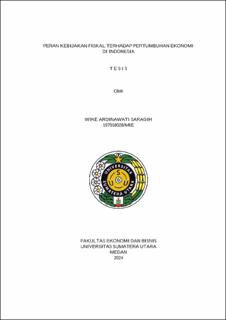| dc.description.abstract | Fiscal policy is considered capable of comprehensively enhancing economic growth. This study employs a quantitative approach using the Auto-Regressive Distributed Lag model. The variables utilized in this research include Economic Growth, Government Expenditure, Tax Revenue, Human Capital, and Foreign Debt. The findings indicate that, in the short term, government expenditure has a positive and significant effect on economic growth, whereas, in the long term, government expenditure has a positive but insignificant effect. Taxes have a negative and significant impact on economic growth in the short term, while in the long term, taxes have a negative but insignificant effect on economic growth. Human capital exerts a positive and significant influence on economic growth in both the short and long terms. Conversely, foreign debt has a negative and significant impact on economic growth in both the short and long terms. Therefore, the policy of optimizing government expenditure on infrastructure projects and programs that directly impact productivity, coupled with increased investment in education and training programs that are relevant to labor market needs and technical skills, is expected to achieve sustainable economic growth. | en_US |


